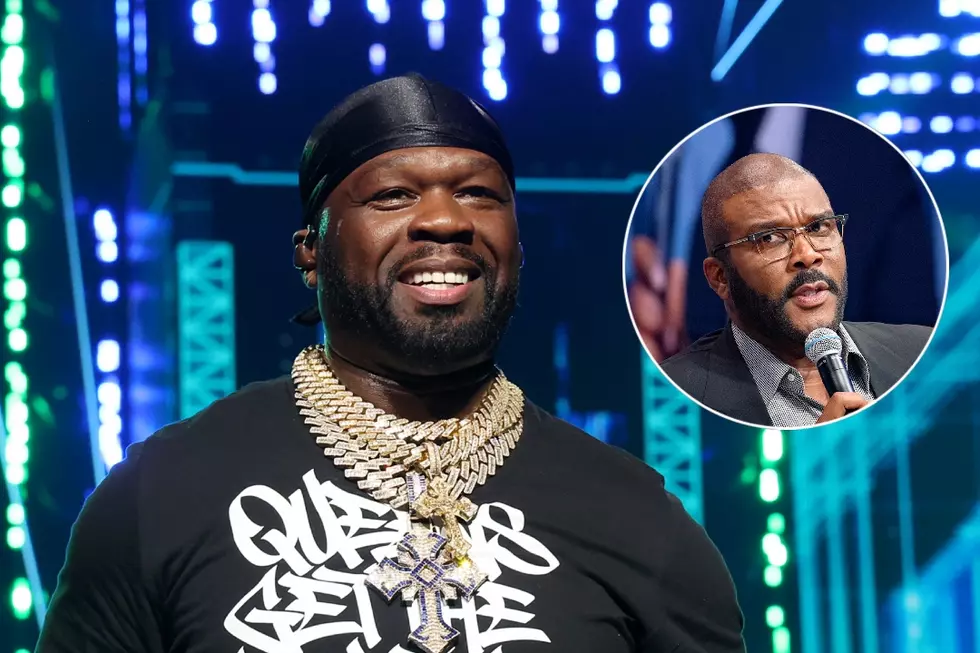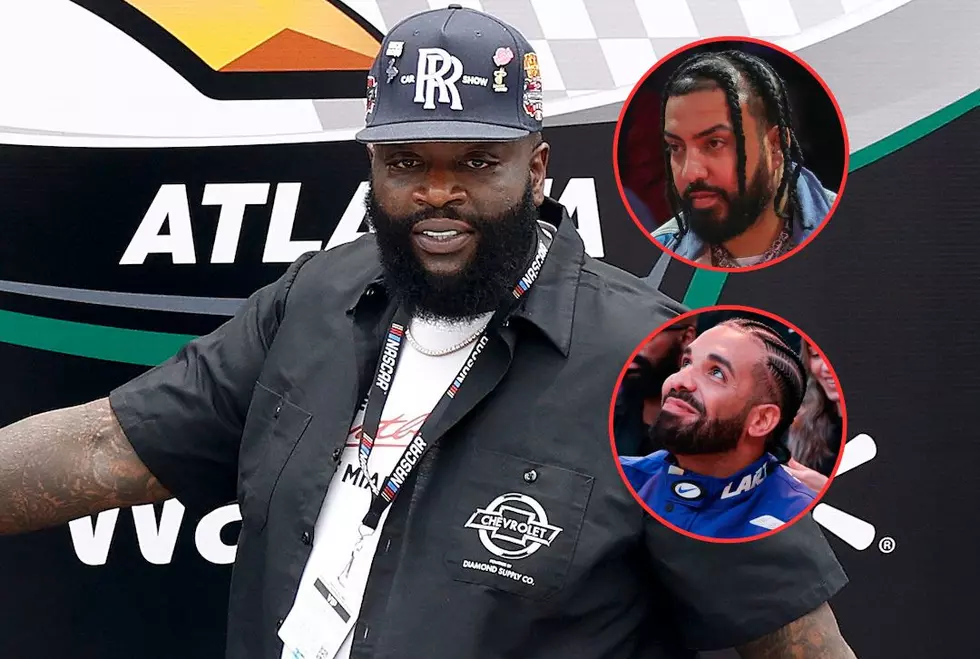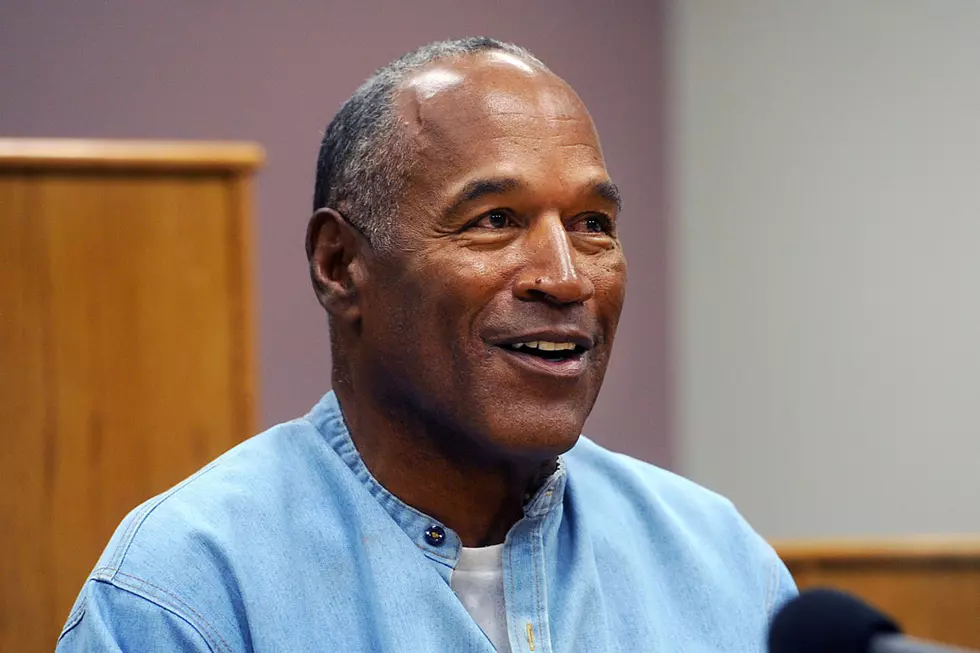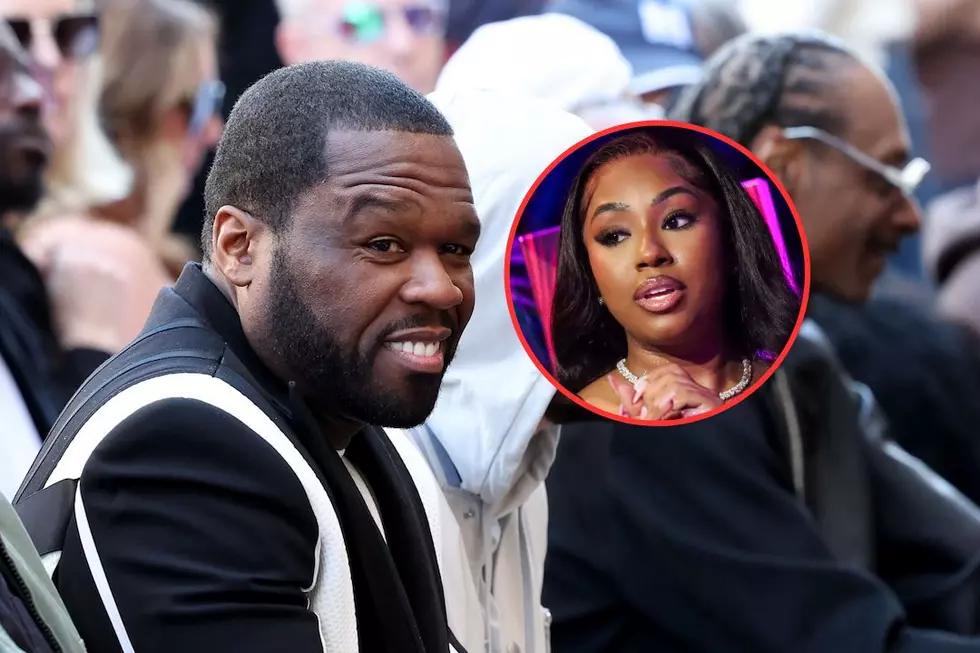![50 Cent: Higher Learning [Excerpt From the Dec./Jan. 2012 Issue]](http://townsquare.media/site/812/files/2011/12/50-Cent-XXL-Gallery-1.jpg?w=980&q=75)
50 Cent: Higher Learning [Excerpt From the Dec./Jan. 2012 Issue]
50 Cent is at a crossroads. A decade ago, the man born Curtis Jackson III, 36, overhauled the rap game with a legendary mixtape run that earned him a blockbuster deal with Shady/Aftermath/Interscope and had other labels feverishly combing the country in search of the next street-approved MC. Ten years and four albums later, however, the artist once considered the standard-bearer in hip-hop has actually become something of an anomaly. Aggressive content, as he liked to put it, no longer dominates the charts. Instead, a softer style of emotional, R&B-tinged rap rules on radio, and weirdo MCs populate the blogs, making Fif an outsider once again. “I don’t see what I fell in love with,” he says about the current music climate. “So now I gotta make music that reflects what N.W.A made. I have to make music that has the moments that Nas had. I have to make music that has what Biggie offered.”
Coming off his least successful album, 2009’s Before I Self Destruct, which sold fewer than 500,000 copies, these days, 50 has a larger profile for his endeavors outside of music than for those inside the recording booth: the $200 million deal he struck in 2010 with Lions Gate Entertainment to launch his Cheetah Vision Films production company (through which he has written, produced and starred in Gun, with Val Kilmer, and Things Fall Apart, with Ray Liotta); the multimillion-dollar stake in Glacéau’s Vitaminwater; his newest label, G-Note Records; his first business venture, G-Unit Records, to which he recently signed Atlanta trap rapper Shawty Lo; and his latest business, SMS Audio, which has resulted in SYNC by 50 headphones. This last venture, of course, puts him in direct competition with Interscope chairman Jimmy Iovine and Aftermath founder Dr. Dre, who debuted their Beats by Dre headphones in 2008, and who are the same executives 50 may or may not negotiate his next recording contract with, after the release of his forthcoming album.
His lips are sealed when it comes to such decisions. Today, Fif is prepping an as-yet-untitled five-song EP and focusing a lot of his energy on his Street King charity campaign to feed impoverished kids in Africa. He sat down with XXL in October, at Fast Ashley’s Studios, in Williamsburg, Brooklyn, to talk about the future.—Interview by Carl Chery and Jayson Rodriguez
XXL: During the photo shoot, you asked to listen to some new hip-hop artists. What do you think of the current regime in rap?
50 Cent: The whole culture, I think, is a little…confused. It’s not what I fell in love with, you know? So my job is to make a album that doesn’t have any holes in it, that is a representation of all of the elements I fell in love with. So, like, I look at artists to find what I like about them or why they’re hot or why they exist. And then you see that we’re creating momentum. We’re creating synthetic heat for new artists to generate interest and revenue. So the sales is some shit that ain’t really hot. You see what I’m saying? Like, the actual business of music is saying, “Oh, he’s hot!” and “Let’s try and do something to market it and sell it.” But there’s some shit that’s organic that’s out there that you see, like, without record-company assistance. People are gravitating to it.
How does that affect you, as a vet, to see that going on?
When I was in the mixtape circuit, there was a lot going on. I was able to take things that I wish I made myself and do ’em over. Now it’s not a lot of shit out there I would do over. I’m like, Nah, that ain’t even it right there. You know what I’m saying? When Black Rob had “Whoa!,” I wish that was my record. I wish “Put Your Hands Where My Eyes Could See,” by Busta Rhymes, was my record. Fuckin’ “Lean Back,” I wish that was mine. You see what I’m saying? And you know me and Fat Joe don’t get along. You know what I’m saying? But to the culture, when you have those moments… And I’m sure they’ll tell you they wish they had “In Da Club” and “P.I.M.P.”
Does it make it harder for you to get inspired?
You know what? It makes it a difficult process of building a album. ’Cause when I hear somebody else shit is hot, I go, Oooh, I got to top that. That’s the competitive nature of hip-hop. You can’t take what’s in the DNA of the artist out. You’ll see, at different points, when I’m not active, you’ll see there’s still competition going on quietly between artist to artist. Or they’ll listen and go, I’ma kill it. If you take your time building a project that you feel is an impact on the time period—’cause that’s what it is—it’s important; music marks time. Then your peers that are in cycle are doing exactly what you’re doing. You know what I mean? So there’s no way that you can’t be competitive with what they’re doing, on some level.
So who are you competing against?
Well, for me, I’m still up against what I’ve done. So in order to top it, I know it’s a difficult task. You know, I see the bloggers. My audience hasn’t grown with me. They keep saying, “Aw, man, I want the old 50!” ’Cause those people, it would take them on a safari. I was bringing them close enough to the animals, without being able to get hurt. I was taking them into my neighborhood, where you can very well get your ass killed.
FOR MORE ON THE 50 CENT FEATURE GO TO PAGE TWO
You’ve been working with Dr. Dre on Detox. Has he worked with you yet on your material?
Dre helped me a lot on this record. I went to Los Angeles, was working out there
for a little bit. I was working on the Detox records, right. I keep saying to Dre, I’m like, “Yo, you don’t have to invent nothing. All they want is a strong version of what you gave last time.” They need a new version of that. It’s like Sade. She goes away for six years, and then she comes back with a new disc. You go, I love this shit! It reminds you of the fuckin’ shit that she gave you before she left. There’s certain artists that have that luxury. You could go away and still be interesting enough to come for people to want to hear that effort. Dre is like that. As I’m busy telling him that, I go, “Wait, maybe I’m bugging for some of the shit that I’ve been doing.” You know what I mean?
So how do you balance that out, though? Giving people what they want, and allowing yourself to develop?
You mean “be creative.” ’Cause when it comes time… This is an even more interesting question: How do you write what reflects what you fell in love with within hip-hop culture while trying to send the right message to the audience?
Well, that’s a big question for you.
Well, for me, the music is an artistic choice. I’ll say, from the very beginning, that I can care less about a critic or how someone judges me for the actual music. You see, people understand within hip-hop culture that I’m passionate about actually trying to do something different. I want to make a change in a different way. This is about me personally feeling like I wanna mean more after I’m dead, when I’m gone.
You mean, from just being an artist?
Than just being an actual artist. I want to affect people’s lives in a positive way. When you look at entertainment for entertainment purposes, they may provide all the images we create through the music or in film, and I’ll explain it to you in a different way. All right, see, sexuality is necessary for entertainment purposes, so there’s a sex scene in films. Death is necessary in films, so you see people get killed a lot. In action films, being in life-threatening situations is entertaining, because death is our fate. If you look at the details that actually create scenarios that we identify with emotionally at different points, where you can feel emotion in actual films, we do the same thing through the music we create. Now, this actual project that I’m creating captures portions of my life from the past, portions of the new outlook that I have, after experiencing these different things. When you get a chance to step out of the bubble—that bubble would be my hood—and you see everything that goes on there doesn’t stop going on without you.
That’s a good feeling.
It feels amazing, because when I identified with that, I see that it’s the same shit. There’s always a new guy on the corner. Regardless what the police swept last week, there’s a new one to replace him. When your music doesn’t come out, there’s always 10 records on the Top 10 countdown. So I feel like I’m not necessary. Do you understand? I’m not necessary to my hood, as far as hustling or being down there, because there’s a replacement for me. I’m not necessary to music, because there’s always 10 in the Top 10 countdown. It’s not necessary for me to be there. Some people may miss me at different points, but I’m not necessary. So I feel like, when I involve myself in something, like the Street King project… It is very necessary that I’m involved there, ’cause nobody’s doing anything about it. And having the ability to partner with the World Food Programme is the presentation that I offer. They don’t take everybody who comes. You feel what I’m saying? But to them, my story’s a story of redemption.
And this all comes back to your music how?
’Cause you don’t get a second chance at a first impression. All of the real talented artists, the artists I respect, it’s the first CD. They’ll tell you Nas’s Illmatic, they’ll tell you Jay-Z’s Reasonable Doubt, they’ll tell you 50 Cent’s Get Rich or Die Tryin’. You see what I’m saying? The giants play in New York, still, nah mean?
There’s also Lil Wayne.
He’s turning into 50 Cent. He’s going through that process of being successful, ’til people go, “You know what? Get the fuck outta here. We don’t want you here no more.” Because you’re successful.
**FOR MORE OF THIS STORY, PICK UP THE DEC./JAN. 2012 ISSUE OF XXL, ON STANDS NOW**
More From XXL









